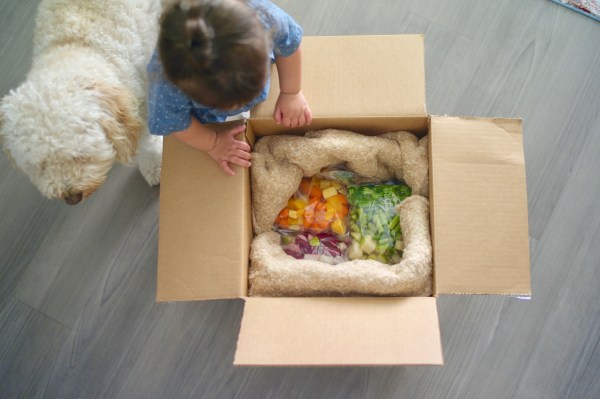It’s a good time to be a baby. It’s also a great time to be a parent who wants to ensure that his or her baby is consuming healthy foods but doesn’t necessarily have the wherewithal to prepare homemade baby food or delicately seasoned purées.
While some established names in the business have increasingly focused on improving their prepared baby foods — including by using pouches, employing more attractive packaging, and listing the specific percentage of each ingredient in its products — a spate of new startups is now aggressively competing for their pint-size end users.
On Monday, John Foraker, the former CEO of organic food brand Annie’s Homegrown, officially joined one of them as its CEO: two-year-old Once Upon a Farm, a maker of cold-pressed baby food that’s headquartered in San Diego.
The company — which reportedly generates less than $1 million in annual sales right now — is also teaming up with actress Jennifer Garner to help market its pouches, which are currently sold through its site, as well as at some Wegmans, Kroger’s, and Whole Foods Market stores.
Foraker has said he expects Once Upon a Farm to grow “big and fast into a highly disruptive force in the organic food space.”
Still, not only is the outfit going up against a number of bigger brands like Plum Organics, Beech-Nut, Earth’s Best, and Ella’s Kitchen, but all are facing competition from startups that are making organic baby food and delivering it to users’ doorsteps.
We know of at least a dozen subscription-based companies to emerge in recent years with an eye toward taking a bite out of baby food market, which is sizable. According to recent statistics out of the research consultancy Zion Market Research, the global baby food market could reach as much as $76 billion by 2021.
Just some of the upstarts include Nurture Life, a two-year-old, Chicago-based, food delivery service that prepares organic meals for kids ages six months to 18 years; Yumi, a two-year-old, L.A.-based “science-based” early childhood meal delivery program that launched recently; Raised Real, a year-old, San Francisco-based subscription service that says its meals are similarly “optimized to support developmental functions”; Pure Spoon, a four-year-old, Austin, Tex.-based company that says it pasteurizes its organic fruits and veggies without the use of chemicals or nutrient-depleting heat; and Little Spoon, a three-year-old, New York-based baby food delivery startup that launched earlier this year and touts as unique its high-pressure processing technique.
Thistle, a four-year-old, Berkeley, Ca.-based company that delivers organic and local foods, also jumped into the baby food business earlier this year, launching Thistle Baby.
It’s no wonder that so many founders are flocking to the industry. According to a 2015 Nielsen report on global baby food trends, the organic sector is experiencing especially strong growth, with sales jumping 26 percent between 2013 and 2015, compared with non-organic baby products, which sank 6 percent.
Consumer aren’t locked into brands, either. On the contrary, parents can be highly fickle if they discover a new product that they perceive as better for their child, as evidenced by a Nielsen survey of people around the world with babies in their homes. Fully 70 percent said they’ve switched brands, often for health reasons. That spells opportunity for savvy food entrepreneurs.
Of course, a lot of the action we’re seeing can also be traced to smaller companies’ sales to bigger companies that are fighting to remain relevant, a trend with no end in sight. In 2013, for example, Danone SA signed a deal for a 92 percent stake in organic baby-and-toddler food company Happy Family. In 2015, North Castle acquired a majority stake in the Atlanta-based organic baby food maker Sprout organic foods.
Plum Organics, Beech-Nut, Earth’s Best and Ella’s Kitchen each have corporate parents, too. The first is owned by Campbell Soup Co.; Beech-Nut is now controlled by a Swiss food conglomerate called the Hero Group; the last two were snapped up by Hain Celestial Group, an American food group that owns Soy Dream among many other brands.
In the meantime, Campbell’s and General Mills are among other food giants to launch venture arms in recent years. Their aim, of course: to sniff out interesting startups.
